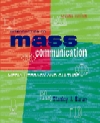Stanley J. Baran
| CNN effect | the power of television pictures to emotionally move people so powerfully that important military and political decisions are driven by those pictures rather than by well-reasoned policy considerations
|
 |
 |
 |
| conventions | in media content, certain distinctive, standardized style elements of individual genres
|
 |
 |
 |
| genre | a form of media content with a standardized, distinctive style and conventions
|
 |
 |
 |
| griots | the "talking chiefs" in orally based African tribes
|
 |
 |
 |
| ideogrammatic alphabet | a symbol- or picture-based alphabet
|
 |
 |
 |
| information society | a society where the creation and exchange of information is the predominant social and economic activity
|
 |
 |
 |
| literacy | the ability to effectively and efficiently comprehend and utilize a given form of communication
|
 |
 |
 |
| literate culture | a culture that employs a written language
|
 |
 |
 |
| media literacy | the ability to effectively and efficiently comprehend and utilize mass communication
|
 |
 |
 |
| multiple points of access | ability of a literate media consumer to access or approach media content from a variety of personally satisfying directions
|
 |
 |
 |
| oral (or preliterate) culture | a culture without a written language
|
 |
 |
 |
| papyrus | early form of paper composed of pressed strips of sliced reed
|
 |
 |
 |
| parchment | writing material made from prepared animal skins
|
 |
 |
 |
| production values | media content's internal language and grammar; its style and quality
|
 |
 |
 |
| syllable alphabet | a phonetically based alphabet employing sequences of vowels and consonants, that is, words
|
 |
 |
 |
| third person effect | the common attitude that others are influenced by media messages, but we are not
|



 2002 McGraw-Hill Higher Education
2002 McGraw-Hill Higher Education